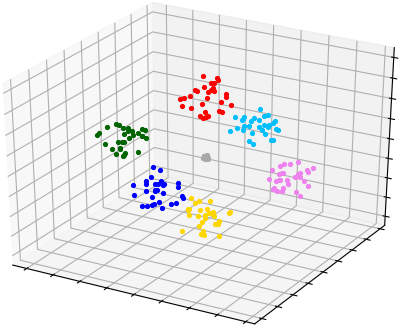 |
pyclustering
0.10.1
pyclustring is a Python, C++ data mining library.
|
 |
pyclustering
0.10.1
pyclustring is a Python, C++ data mining library.
|
Represent algorithm for searching optimal number of clusters using specified K-algorithm (K-Means, K-Medians, K-Medoids) that is based on Silhouette method. More...
Public Member Functions | |
| def | __init__ (self, data, kmin, kmax, **kwargs) |
| Initialize Silhouette search algorithm to find out optimal amount of clusters. More... | |
| def | process (self) |
| Performs analysis to find optimal amount of clusters. More... | |
| def | get_amount (self) |
| Returns optimal amount of clusters that has been found during analysis. More... | |
| def | get_score (self) |
| Returns silhouette score that belongs to optimal amount of clusters (k). More... | |
| def | get_scores (self) |
| Returns silhouette score for each K value (amount of clusters). More... | |
Represent algorithm for searching optimal number of clusters using specified K-algorithm (K-Means, K-Medians, K-Medoids) that is based on Silhouette method.
This algorithm uses average value of scores for estimation and applicable for clusters that are well separated. Here is an example where clusters are well separated (sample 'Hepta'):
Obtained Silhouette scores for each K:
K = 7 has the bigger average Silhouette score and it means that it is optimal amount of clusters:

Definition at line 371 of file silhouette.py.
| def pyclustering.cluster.silhouette.silhouette_ksearch.__init__ | ( | self, | |
| data, | |||
| kmin, | |||
| kmax, | |||
| ** | kwargs | ||
| ) |
Initialize Silhouette search algorithm to find out optimal amount of clusters.
| [in] | data | (array_like): Input data that is used for searching optimal amount of clusters. |
| [in] | kmin | (uint): Minimum amount of clusters that might be allocated. Should be equal or greater than 2. |
| [in] | kmax | (uint): Maximum amount of clusters that might be allocated. Should be equal or less than amount of points in input data. |
| [in] | **kwargs | Arbitrary keyword arguments (available arguments: algorithm, random_state). |
Keyword Args:
Definition at line 416 of file silhouette.py.
| def pyclustering.cluster.silhouette.silhouette_ksearch.get_amount | ( | self | ) |
Returns optimal amount of clusters that has been found during analysis.
Definition at line 506 of file silhouette.py.
| def pyclustering.cluster.silhouette.silhouette_ksearch.get_score | ( | self | ) |
Returns silhouette score that belongs to optimal amount of clusters (k).
Definition at line 518 of file silhouette.py.
Referenced by pyclustering.cluster.silhouette.silhouette_ksearch.process().
| def pyclustering.cluster.silhouette.silhouette_ksearch.get_scores | ( | self | ) |
Returns silhouette score for each K value (amount of clusters).
Definition at line 530 of file silhouette.py.
| def pyclustering.cluster.silhouette.silhouette_ksearch.process | ( | self | ) |
Performs analysis to find optimal amount of clusters.
Definition at line 451 of file silhouette.py.
Referenced by pyclustering.cluster.silhouette.silhouette_ksearch.get_scores().